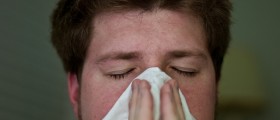
Pneumonia is a respiratory disease that involves lung inflammation, usually with congestion. The two main types are bacterial and viral pneumonia. Viral pneumonia is usually not a very serious condition and in most cases it does not qualify as medical emergency. However, in some cases it can be quite serious, even life-threatening, especially for elderly people, for infants and for patients whose immune system is severely compromised, for example HIV/AIDS patients.
Causes of viral pneumonia
The viruses known for causing pneumonia include influenza virus, respiratory syncytial virus and herpes virus. Viruses responsible for flu and common cold, such as adenoviruses, can also cause pneumonia.
Symptoms of viral pneumonia
There are not many symptoms characteristic for viral pneumonia. They mostly include low grade fever and chills, possibly with sweating. The patient may feel weak and tired and the muscles may be achy. Headache is also often present as a symptom of viral pneumonia.
Since viral pneumonia is a respiratory disease, coughing is often present, usually with sputum. The chest may feel tight and achy and there may be some difficulty breathing, such as rapid breathing.
Treatment for viral pneumonia
Unlike bacterial pneumonia, viral pneumonia cannot be cured with antibiotics. Antibiotics are only useful for diseases caused by bacteria and viruses are absolutely immune to them. There is no particular treatment for viral pneumonia, other than taking plenty of fluids, resting, avoiding physical strain, eating healthy and increasing the intake of vitamins. Some over-the-counter medications can be used to alleviate the symptoms - analgesics for headache and general soreness, antipyretics for the fever and cough drops or syrup for the cough.
Prevention of viral pneumonia
As for the prevention of viral pneumonia, the proper hygiene is the key. This disease is contagious and it can pass easily from one person to another. A healthy person can contract the virus causing pneumonia through direct or indirect contact with a person who is already sick. People who have viral pneumonia should make sure they do not pass the virus to others, which is why it is important to use a disposable handkerchief when sneezing or coughing, to frequently was hands and to avoid contact with children, elderly and sick people.
Smokers are at higher risk of viral pneumonia than the non-smokers, so quitting smoking is very important in prevention of this respiratory disease. Avoiding second-hand smoke is also very important. Any kind of environment pollution, as well as allergens and irritants, increase the risk of pneumonia, so those should be avoided as well.

















Your thoughts on this
Loading...